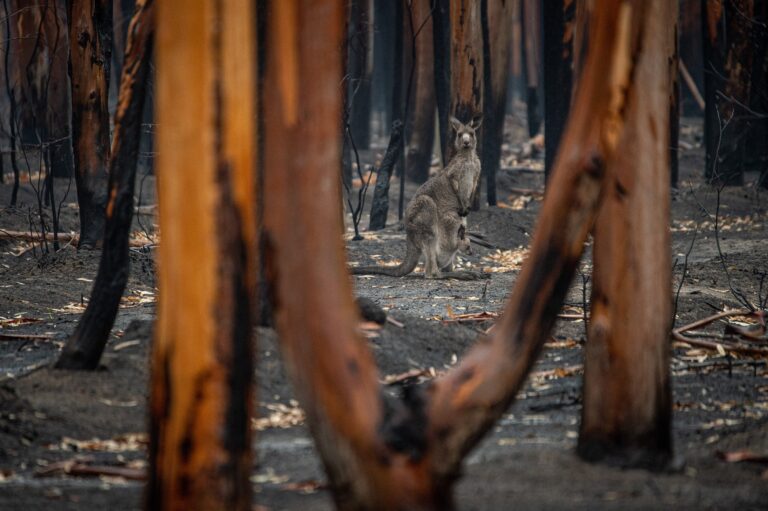The 2022-23 Federal Budget was released in a time of crisis across much of the country, and volunteers have been on the front lines. And yet, investment to support volunteering during emergencies and in their aftermath is overlooked in the Budget. The increasing frequency and scale of emergencies in Australia is creating the need for an effective, coordinated approach for the involvement of volunteers in disasters. Without strategic planning and resourcing of more coordinated volunteer involvement, Australia will be ill-equipped to handle its most urgent challenges.
Volunteering plays a vital role in crisis response and recovery in Australia. According to the most recent Report on Government Services, there are over 230,000 volunteers in government emergency services, which includes firefighters, fire service support staff, support roles in State and Territory Emergency Service, ambulance operatives, and operational and corporate support in ambulance service organisations. The number of volunteers in the broader emergency management sector, including in disaster relief, recovery, and resilience, is certainly much greater, though no current data fully captures the breadth of volunteer involvement in the sector.
Few will be surprised by these numbers. The efforts of volunteers in recent crises, including the ongoing floods in New South Wales and Queensland and the 2019-20 Black Summer bushfires, have been applauded by the press, politicians, and the broader Australian public.
But when it comes time to invest, the Australian Government is silent on volunteering. Despite significant investments in disaster support, no additional funding was allocated to support the development of more coordinated national natural disaster arrangements which better plan for volunteer involvement in crisis response and recovery.
We need to step up
The Royal Commission into Australia’s National Natural Disaster Arrangements included two recommendations on volunteering, and emphasised the importance of volunteer coordination and recovery volunteerism. The Australian Government has supported the recommendation to convene regular forums for charities and volunteer groups to improve coordination of recovery support, but has yet to enact it.
This would be a useful measure, but more could be done to improve clarity in existing national disaster arrangements. Currently, the interplay of national mechanisms with state and territory government measures is complicated, with considerable variation in the structures and forums for coordination within and across state/territory and local governments. Further, smaller charities are inconsistently included in the planning of recovery arrangements. This lack of clarity creates significant difficulties for volunteer organisations involved in response and recovery.
To better support emergency management volunteering, the Australian Government should establish a national forum, with similar forums at state/territory level, to bring together and coordinate organisations active in disasters. Of particular focus should be collaboration between organisations which engage volunteers in disaster response, the establishment of guiding principles, best practice, and resources for organisations, and a joint approach to emergency volunteering platforms to facilitate effective registration, management, and deployment of spontaneous volunteers.
More coordinated arrangements could also strengthen volunteer involvement during other crises. Volunteers and volunteer involving organisations have played a crucial role in responding to the COVID-19 pandemic, supporting the delivery of key services and helping to mitigate the pandemic’s impact on mental health and social isolation.
At the same time, heightened demand for services and shortages of volunteers due to lockdowns and other public health restrictions have placed immense pressure on organisations. But a lack of clarity on volunteering in official guidance and communications, insufficient planning for the inclusion of volunteers in food relief, social support, and vaccination programs, inconsistent financial support measures for charities and not-for-profits, and poor engagement with the sector often frustrated effective volunteer involvement. If volunteers are to play a long-term role in Australia’s preparedness and recovery, then clearer planning is urgently needed. That begins with strategic and consistent funding arrangements.
What is in the Budget?
Analysis of the Budget reveals a scattershot approach to volunteering. It is mentioned in the occasional program or line item, but funding for volunteer involvement is inconsistent across portfolios. For example, the package of funding allocated for mental health programs includes $4 million to the Black Dog Institute to establish a new National Mental Health Service for Emergency Service Workers and Volunteers. This is a welcome measure, but volunteers also support the Government’s priorities across a striking range of portfolios—major spends across environment, education, skills and employment, health, home affairs, and social services all include funding for programs supported by volunteers. The lack of clear responsibility for volunteering in many portfolios is cause for concern.
Perhaps the most important consideration is that all these funding decisions, disconnected as they are in the Government’s thinking today, are not isolated from the broader volunteering ecosystem. They each depend, for example, on the continued ability and willingness of volunteers to be involved in their respective sectors.
Unfortunately, the data on volunteering in Australia shows a significant decline in recent years. A study conducted by the Australian National University Centre for Social Research and Methods found that the proportion of adult Australians engaging in formal voluntary work, which is done through an organisation or group, fell from 36.0 per cent in late 2019 to 24.2 per cent in April 2021. Further, only slightly more than half (56.4 per cent) of those who stopped volunteering in 2020 resumed in the 12 months leading up to April 2021, despite the easing of lockdowns and social distancing restrictions in many jurisdictions at that time. Figures from the Australia Bureau of Statistics also suggest that the proportion of Australians who volunteer through an organisation or group has been declining steadily since 2010.
Describing the challenges facing Australia on Budget night, the Treasurer claimed that now is the time for the Government to “stick to [their] plan.” But it’s clear that there is no plan for volunteering. In last year’s Budget, funds were allocated to develop a national strategy for volunteering, now being taken forward within the volunteering ecosystem. This strategy will need to translate into a funded plan. Without adequate support, the vital contributions of volunteering to Australia’s resilience are at risk.
Other Budget Forum 2022 articles
Trusts and Tax Avoidance – Extension of Funding for ATO Taskforce, by Sonali Walpola.
Vehicle Taxing Dilemma Between Environment and Inequality, by Yogi Vidyattama, Robert Tanton and Hitomi Nakanishi.
A Fairer Tax and Welfare System for Australia, by Ben Phillips and Richard Webster.
Claiming Crypto Donations under Division 30, by Elizabeth Morton.
The Budget, Fiscal Policy and an Outbreak of Inflation, by Chris Murphy.
Natural Disasters and Government Policy Challenges, by John Freebairn.
Petrol Excise Cut in the Budget! What About the Transition to Zero-Emission Cars? by Diane Kraal.
For Social Infrastructure and Tax Reform, We Need a New Federal Fiscal Bargain, by Miranda Stewart.
A Free Lunch From Government Debt? It Certainly Looks That Way, by John Quiggin and Begoña Dominguez.
On the Limits of Fiscal Financing in Australia, by Chung Tran and Nabeeh Zakariyya.





Recent Comments